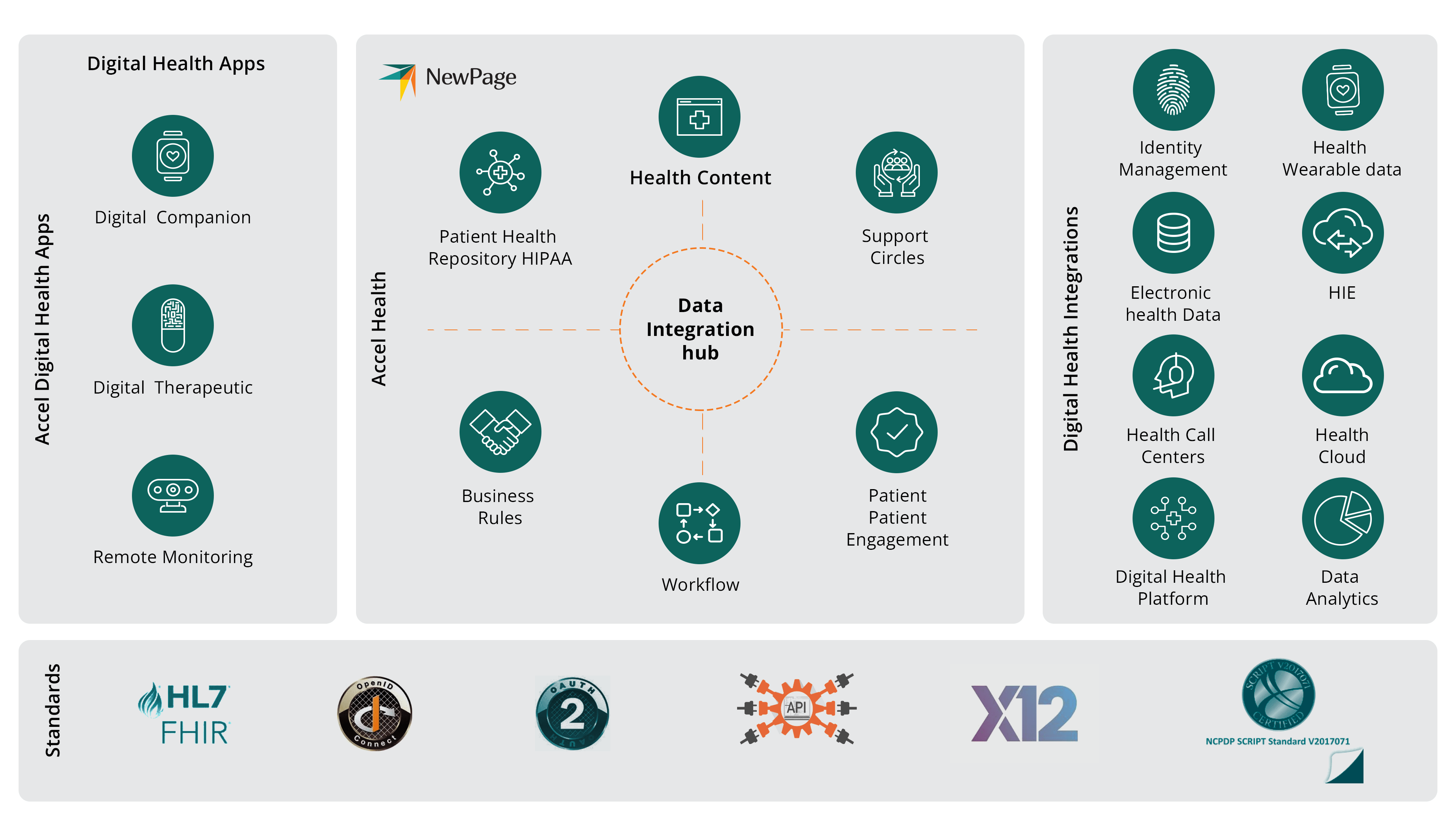Explore the ongoing quest of finding the right place for DTx in the healthcare ecosystem. Also, discover the necessity for a “Unified Integration Platform” that seamlessly integrates digital health solutions. This empowers commercial teams to efficiently develop and launch patient apps while also enabling patient service teams to improve global patient access and engagement.
Key Takeaways –
- Transition from standalone to multi-purpose digital health solution.
- The lack of sustainable business models puts venture capitalists at stake.
- Need to develop and release new software or solutions rapidly to the market.
- Companion apps are already helping the industry fulfill patient care and support requirements.
- The need for strategic partnerships between the pharmaceutical industry and digital therapeutics.
Opportunity –
There is a need for a unified integration platform that addresses the need for agile development & methodologies in this industry.
Digital therapeutics (DTx) is a relatively new market, gaining much attention and investment in recent years. So, does this mean that DTx will become readily available to patients soon? At DTx East 2023, the leadership team of NewPage Solutions connected with many thought leaders in business and industry to learn some important insights: DTx has encountered challenges in defining its position within care pathways while facing significant barriers regarding evidence. Consequently, it confronts unpredictable requirements across various commercialization pathways, such as authorization, value assessment, reimbursement, and pricing.
So, what is the next stage of evolution towards a coordinated patient journey? Let’s dive deeper into key takeaways presented at this conference and understand why this realization is critical for any organization embarking on the DTx journey.
Key Takeaways and a Major Breakthrough from DTx East 2023
Shift from intended use to multi-purpose digital solutions.
Beyond standalone apps, multi-purpose digital health solutions can tackle various health conditions, such as co-morbidities, chronic diseases, and mental health issues while offering a holistic approach to patient care.
The discussions unveiled an intriguing perspective on Digital Therapeutics (DTx), extending its potential beyond standalone apps for specific medical conditions. It highlighted that the actual value of DTx lies in its capacity to tackle a diverse array of health conditions, such as co-morbidities, chronic diseases, and mental health issues, while offering a holistic approach to patient care.
Imagine a DTx app that empowers diabetes patients to manage glucose levels, track nutrition, and physical activity, and receive CBT for depression. These innovative solutions will revolutionize patient care, enhance health outcomes, and accelerate DTx adoption for commercial success.
Beyond standalone apps, multi-purpose digital health solutions can tackle various health conditions, such as co-morbidities, chronic diseases, and mental health issues while offering a holistic approach to patient care.
However, it seems challenging to effectively present a compelling case to stakeholders grappling with the “value paradox” – the skepticism towards digital solutions stemming from insufficient evidence. If successful, an all-in-one DTx solution has the potential to address multiple health issues and generate robust clinical and real-world data, thereby enhancing trust and confidence in these solutions.
Business models around DTx are evolving and remain experimental.
The business models of DTx are continuously evolving, facing uncertainties in reimbursement, pricing strategies, provider adoption, and patient willingness to pay. This lack of sustainability poses an even more significant challenge for DTx vendors backed by venture capital, as they need to demonstrate a revenue stream to their investors that goes beyond investments from the pharmaceutical industry.
Many of them are addressing these challenges through innovative pricing models, such as outcome-based, subscription-based, reimbursement-based, and value-based arrangements. However, further research and collaboration while seeking explicit guidance from regulatory bodies will further evolve sustainable business models.
However, the real challenge lies in the steps that DTx vendors will take next, as it may take longer than expected for the regulatory landscape and DTx reimbursement policies to evolve.
Accelerating DTx Software Releases.
The need to efficiently scale the global delivery of patient digital health apps, using API-based digital healthcare platform, ‘ACCEL,’ that brings agile development & methodologies in this industry.
One key aspect of success in the digital therapeutics industry is the ability to develop and release new software or solutions rapidly. With patients becoming more tech-savvy, they expect regular updates and new features from their digital health solutions. DTx companies must have efficient development processes to meet these demands while striking the perfect balance between regulatory requirements, maintaining a competitive edge, and delivering quality.
At the event, NewPage Solution delivered insightful lessons and expert advice on efficiently scaling the global delivery of patient digital health apps, showcasing an API-based digital healthcare platform, ‘ACCEL,’ that addresses the need for agile development & methodologies in this industry.
Companion apps are becoming a major avenue for enhanced patient care and support.
The evolution of companion apps is a significant opportunity for stakeholders to make a strategic shift towards enhanced patient services programs and optimize the current state of patient outcomes.
As Dtx vendors attempt to define the opportunity against a backdrop of reimbursement challenges, companion apps are helping the industry fulfill the required patient care and support the needs of patients. These apps, often developed by pharmaceutical companies, offer a digital approach to complement traditional treatment pathways and manage patient health. They can serve as a tool for patient education, medication adherence, symptom tracking, and personalized support for improving patient experience and outcomes.
By leveraging algorithms and AI, these apps could assess health, suggest therapy modifications, and predict health crises. This shift would revolutionize patient care, making it more personalized, proactive, and efficient.
The evolution of companion apps is a significant opportunity for stakeholders to make a strategic shift towards enhanced patient services programs and optimize the current state of patient outcomes.
The presentation and panels at the event made it very clear that the industry’s future will continue to be challenging. However, the evolution of companion apps is a significant opportunity for stakeholders to make a strategic shift towards enhanced patient services programs and optimize the current state of patient outcomes.
Fostering strategic alliances with Pharma & DTx companies
On one hand, The recent news about Pear Therapeutics’ bankruptcy and news that Biogen is closing its digital health unit has raised concerns about the sustainability of the digital therapeutics business model. On the other hand, pharmaceutical companies have different challenges with cost pressures and their long and complex drug development pipelines, expensive clinical trials, and increasingly stringent regulations.
These factors emphasize the need for strategic partnerships between the pharmaceutical industry and digital therapeutics. Pharma companies must partner with vendors that can help them scale and maintain innovative initiatives, deliver value for patients, and have a return on investment (ROI) while containing costs.
Opportunity Screaming to be Solved! Integrating Digital Patient Solutions into Healthcare Ecosystem.
Why is there a lack of a unified approach for integrating digital health solutions into the healthcare ecosystem? Despite their potential, many of these solutions fall short of adequately supporting patients along their healthcare journey, mainly due to the absence of an integrated ecosystem.
So, what is the solution? The answer lies in adopting a ‘Platform-Based Approach – A Global API-Driven Platform’ offering a seamless integration solution that –
- Empowers commercial teams to create, launch, and expand digital health applications globally for diverse health conditions and therapeutic areas.
- Facilitates patient service teams in enhancing patient access and engagement within and outside the healthcare provider ecosystem.
The benefits of the platform-based approach are multifold. It:
- Reduces the time and costs of developing digital health solutions while enabling easy integration into existing healthcare systems
- Streamlines access to various digital tools, improving patient care and adherence.
- Empowers healthcare providers with a comprehensive view of patient health by collecting data from multiple sources, facilitating informed clinical decisions.
- Promotes scalability and growth by increasing the adoption of emerging digital tools and creating new revenue streams.
Indeed, challenges exist for Digital Therapeutics (DTx), and the industry is still grappling with unanswered questions. However, once it establishes a solid foundation of real-world evidence, the digital healthcare industry must focus on strengthening patient apps and enhanced patient service programs leveraging an integrated ecosystem. This emerging trend seeks to improve our understanding of the patient journey, and leading pharmaceutical companies are already pioneering solutions in this field.
“NewPage Solutions is excited to leverage a unified platform, ACCEL, for developing and integrating digital health apps and patient service programs. We have successfully developed and deployed over 50+ patient apps across 25+ global locations with this platform. By fostering collaboration among pharmaceutical companies, tech firms, healthcare providers, and payers, we can deliver patient-centric solutions, address unmet needs, and enhance coordinated care. We eagerly anticipate partnering with industry leaders to establish a sustainable, patient-centric healthcare ecosystem, effectively harnessing the power of digital health tools.”
Let us know your thoughts, and join us in the conversation on how we can shift the momentum towards a more connected, efficient, and patient-centric healthcare system.


